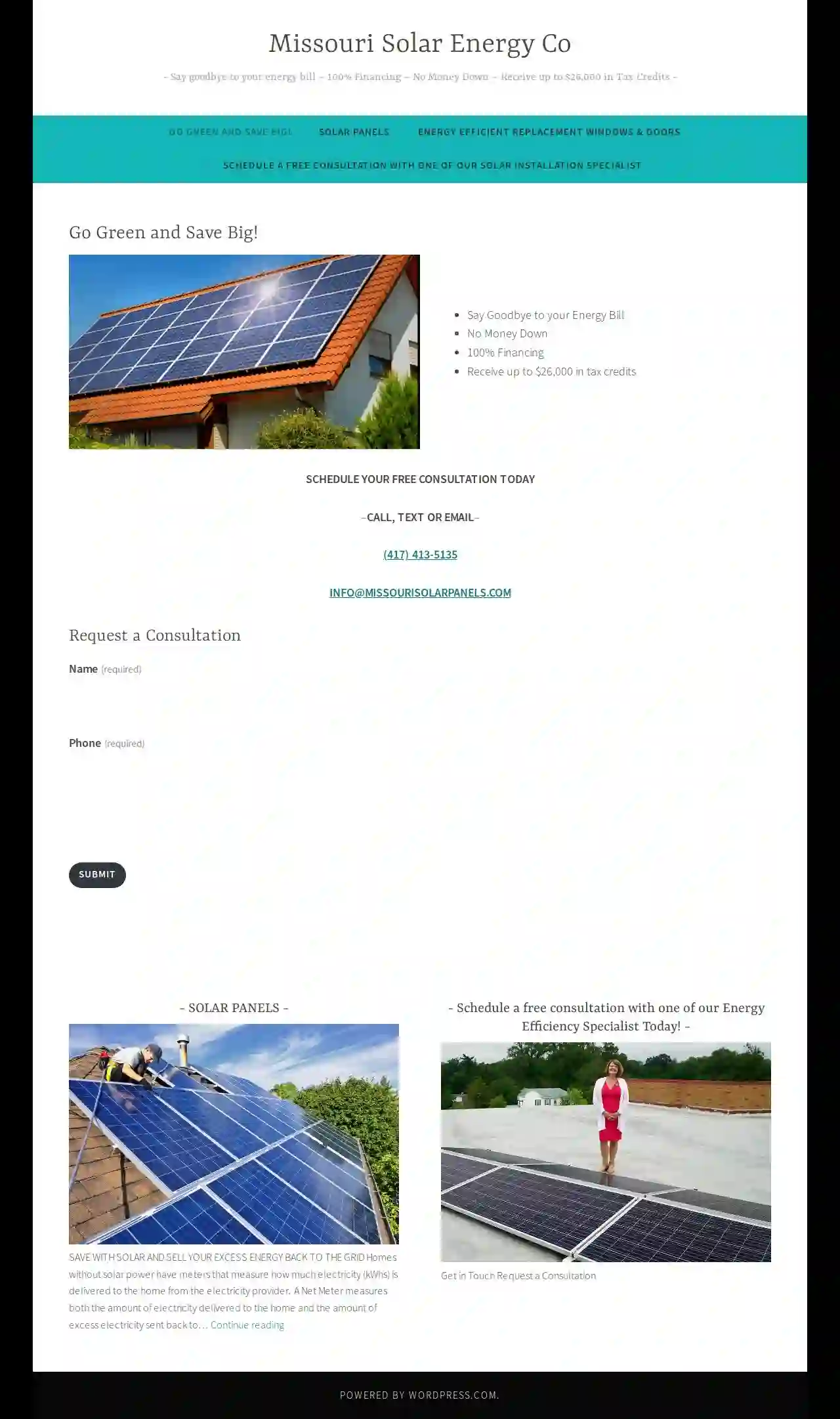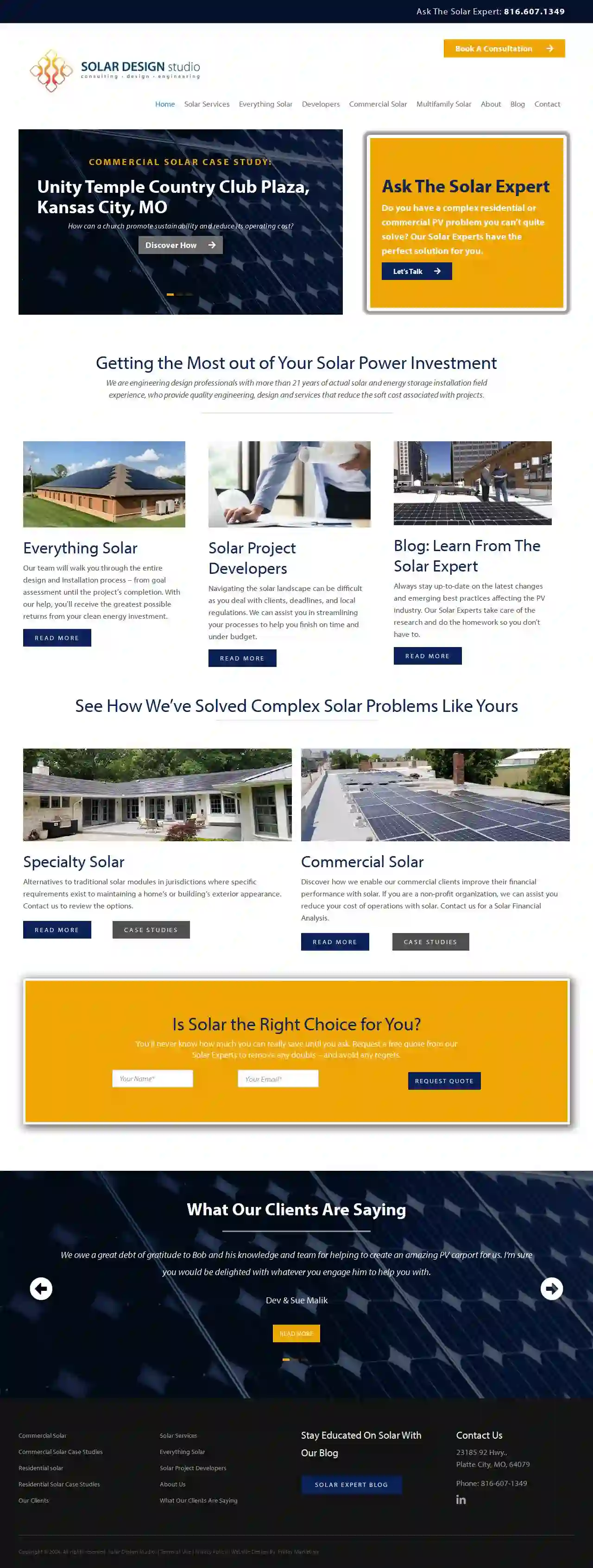Solar Installers Bridgeton
Top 10 Solar Panels For Homes in Bridgeton
Get 3 FREE Solar Energy Company quotes for your project today! Compare profiles, reviews, accreditations, portfolio, etc... and choose the best offer.

APC Solar - Commercial Solar Installation Contractor
53 reviews3202 W Republic Road, Springfield, MO, 65807, USAPC Solar is a leading provider of commercial solar installations, offering turnkey solutions for businesses, farms, and commercial properties. With over 21 years of experience and over 750 installations, they specialize in industries such as agriculture, casinos, churches, commercial, hotels, industrial, manufacturing, municipalities and governments, schools, sports facilities, and tribal land. Their services include commercial solar installations, development, solar panel financing, EPC, MACRS depreciation, solar engineering, and third-party verification.
- Services
- Why Us?
- Accreditations
- Our Team
- Testimonials
- Gallery
Get Quote
Missouri Solar Energy Co
4.36 reviewsSt. Louis, USMissouri Solar Energy Co specializes in providing solar panels and energy-efficient replacement windows and doors. They offer 100% financing with no money down and up to $26,000 in tax credits. Their services aim to help customers save big and go green.
- Services
- Why Us?
- Gallery
Get Quote
Son Solar Systems, LLC
58 reviewsSt. Louis, USThis site is under development. This page indicates the webmaster has not uploaded a website to the server. For information on how to build or upload a site, please visit your web hosting company's site.
- Services
- Why Us?
Get Quote
Helio GreenTech
4.956 reviewsNorth Kansas City MO, 1321 Burlington st Suite 300, 64116, USSolar Power Installing a greener future for the earth, and your wallet. Helio GreenTech is a top rated, locally owned and operated solar installer in Kansas City servicing Kansas and Missouri. We are committed to building a sustainable future that’s beneficial environmentally and financially for all. Installing solar has never been an easier choice. With rising utility costs solar can offer lower payments than what you are paying today. Deciding to go solar means you have cleaner energy and more affordable bills.
- Services
- Why Us?
- Accreditations
- Our Team
- Testimonials
- Gallery
Get Quote
Solar Design Studio
Platte City, MO, 23185 92 Hwy, 64079, USSolar Design Studio is a leading provider of solar solutions, offering a range of services including solar project development, commercial solar solutions, and residential solar installations. With over 21 years of experience in the solar industry, the company has established itself as a trusted partner for clients seeking sustainable energy solutions. Their team of experts works closely with clients to understand their energy needs and design tailored solar solutions that meet their financial and environmental goals. Solar Design Studio is dedicated to helping clients reduce their operating costs and promote sustainability through the use of solar energy.
- Services
- Why Us?
- Accreditations
- Our Team
- Testimonials
- Gallery
Get Quote
Astrawatt Solar
535 reviews3525 Roanoke Rd, Ste 110, Kansas City, 64111, USAstrawatt Solar is a professional solar panel installer with a mission to provide better solar experiences for customers. Founded in 2016, the company has grown to become the 3rd fastest growing solar company in the United States. Astrawatt Solar focuses on improving the sales process by educating homeowners and providing unparalleled customer service and quality workmanship. The company is vertically integrated, managing plans design, engineering, permitting, utility net meter applications, and the installation of solar panels in-house. Astrawatt Solar has dedicated service teams ready to help with technical support and warranty claims.
- Services
- Why Us?
- Accreditations
- Our Team
- Testimonials
- Gallery
Get Quote
Missouri Solar Energy Industries Association
123 Solar Street, Suite 100, Kansas City, 64101, USThe Missouri Solar Energy Industries Association (MOSEIA) is a nonprofit association leading Missouri’s solar industry. Their mission is to expand solar markets and generate jobs and prosperity for Missourians across the state. MOSEIA advocates for policies that promote the growth of solar energy in Missouri and supports solar businesses and consumers alike. They provide resources for consumers interested in going solar, including information on solar installers and the benefits of solar energy.
- Services
- Why Us?
- Accreditations
- Our Team
- Testimonials
- Gallery
Get Quote
Solar Luxury LLC
58 reviewsSuite 106, N/A, 11252 Midland Blvd, St. Louis, 63114, USSolar Luxury LLC is a leading provider of solar energy solutions in St. Louis, MO, and the Midwest. They offer a range of services including off-grid cabins, campers and RVs, shed and garage power, and system repair. With a focus on eco-friendly and wallet-friendly solutions, Solar Luxury aims to help individuals become self-reliant by getting off the grid. They have been operating since 2014 and have developed new technology specific for the solar industry.
- Services
- Why Us?
- Accreditations
- Our Team
- Testimonials
- Gallery
Get Quote
Dogwood Solar
512 reviewsSuite 110, 1501 Creekwood Parkway, Columbia, 65202, USDogwood Solar is a leading provider of solar energy solutions in Missouri, offering residential and commercial solar systems, battery backup systems, and more. With a focus on sustainability and energy independence, Dogwood Solar helps homeowners and businesses harness the power of the sun through solar site analysis, installation, and maintenance services.
- Services
- Why Us?
- Accreditations
- Our Team
- Testimonials
- Gallery
Get Quote
Jackson Solar LLC
528 reviews123 Solar Street, Suite 100, Solar City, 12345, USAt Jackson Solar, we are committed to educating you about all of the costs and the benefits, and providing you with 'An ethical solution, at an ethical price'. We use only the best products for our installations, including SolarEdge, Enphase, and Generac for energy management, and REC and Q-Cell for energy capture. Our systems are guaranteed long lasting quality and performance with some of the best warranties in the industry. We aim to provide a payoff period of 7.5 YEARS OR LESS, or at most, less than half the life of a general 25 year warrantied solar system.
- Services
- Why Us?
- Accreditations
- Our Team
- Testimonials
- Gallery
Get Quote
Over 4,210+ Solar Installers on our directory
Our solar contractors operate in Bridgeton and surroundings!
SolarCompaniesHub has curated and vetted Top Solar Companies in Bridgeton. Find a reliable contractor today.
Frequently Asked Questions About Solar Installers
- Monocrystalline: Made from a single silicon crystal, known for high efficiency (typically 18-22%) and sleek black appearance.
- Polycrystalline: Made from multiple silicon crystals, slightly less efficient (15-17%) but often more affordable than monocrystalline.
- Thin-film: Made from thin layers of photovoltaic material, lower efficiency (8-12%) but can be flexible and lightweight.
What happens to my solar panels during a power outage?
Will solar panels work during cloudy days or at night?
What is the lifespan of solar panels?
What are the different types of solar panels?
What happens to my solar panels during a power outage?
Will solar panels work during cloudy days or at night?
What is the lifespan of solar panels?
What are the different types of solar panels?
- Monocrystalline: Made from a single silicon crystal, known for high efficiency (typically 18-22%) and sleek black appearance.
- Polycrystalline: Made from multiple silicon crystals, slightly less efficient (15-17%) but often more affordable than monocrystalline.
- Thin-film: Made from thin layers of photovoltaic material, lower efficiency (8-12%) but can be flexible and lightweight.